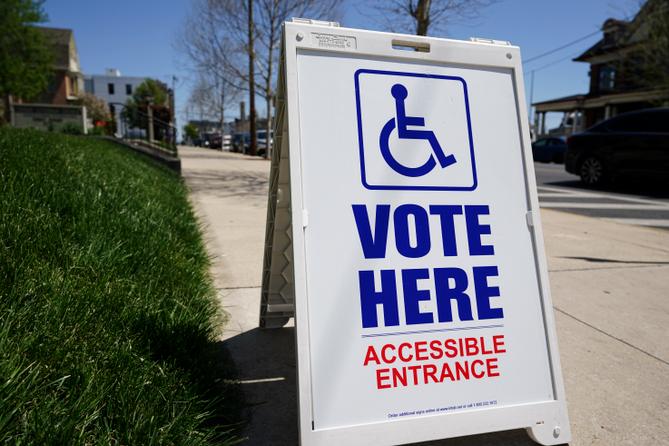This article is made possible through Spotlight PA’s collaboration with Votebeat, a nonpartisan news organization covering local election administration and voting. Sign up for Votebeat's free newsletters here.
Pennsylvania’s Chester County has reviewed more than two-thirds of the provisional ballots cast on Election Day, and confirmed that it has begun counting eligible ballots, though officials still cannot explain what caused a pollbook error that forced independent and third-party voters to use provisional ballots.
County officials said they hope to have the answer by December, after an investigation by an outside firm.
Pollbooks are the lists of registered voters that workers use to check in voters at the polling place. But pollbooks that Chester County distributed for Election Day omitted third-party and independent voters, forcing thousands of them to vote using provisional ballots. Provisional ballots require voters and election officials to take some additional steps, such as signing the envelope in the correct spot, or they will be rejected for technical reasons, and the ballots must undergo additional checks before they are counted.
More than 12,100 Chester County voters cast provisional ballots in last Tuesday’s election, more than in any other election in the county since at least 2016, according to state data.
As of 7 p.m. Tuesday, officials had reviewed more than 8,200 of the provisional ballots to confirm the voters’ eligibility and to check that required fields on the envelope had been properly completed, county spokesperson Rebecca Brain said. The county began counting eligible provisional ballots Tuesday, and Brain said more than 7,200 had been fully counted, and some partially counted.
Voters can track the status of their provisional ballot on the Department of State’s website.
Investigation will look at root causes and county processes
The county said in a statement Monday that it would select an independent investigator by Nov. 17, and provide an update at the Nov. 21 board of elections meeting. It said it would aim to complete the investigation in early to mid-December and present results in December or January.
“As of today, we identified the key questions that must be addressed through the investigation and presented the Board of Elections with several options for how the review can best proceed,” Chester County CEO David Byerman said in the statement.
Brain said the key questions include the root cause of the problem, as well as “what processes and controls were in place” to check the accuracy of the pollbooks, and “how and why did those processes fail.”
Others are also seeking answers. In an email to its members, the Republican Committee of Chester County asked those who served as poll workers to provide information including how many provisional ballots were used, how they were handled, and what assistance or instructions the county provided.
“We need accurate information from every precinct as to the County's total failure to conduct a fair and accurate election," the party said in the email, which was obtained by Votebeat and Spotlight PA.
County changed its initial instructions to poll workers
Robert Fedick, a judge of elections from East Whiteland Township who oversaw voting at a precinct, said he realized there was a problem early on Election Day, when his third voter of the day was unable to check in.
“Next thing you know, I'm calling Voter Services saying, ‘What the heck?’” he recalled. “It was the hardest election I've done in four years. Harder than the presidential.”
Fedick said the county initially instructed him to handwrite voters’ names in the pollbook and allow them to cast a regular ballot. But then, the county told workers to direct the voters to use provisional ballots. One of the county Republicans’ questions to poll workers focuses on this point. Brain said questions about the county’s guidance will be addressed in the county’s investigation.
Fedick said he’s worked with the county’s elections director, Karen Barsoum, for years, and doesn’t believe there was any intentional effort to leave voters out of the pollbook.
“I would just like to know from the county what steps they are taking to make sure this doesn’t happen again, and who didn't do their job,” he said.
John Young has been a poll worker since 2009, and was serving as the judge of elections in West Goshen Township on Election Day. He, too, said the problem surfaced shortly after polls opened.
“As soon as I asked two or three follow-up questions, I immediately knew what the problem was,” he said.
He was unable to get through to county officials on the phone, but said the training, additional materials the county provided, and roving poll workers helped the workers at his voting site deal efficiently with the influx of provisional ballots.
Young, who works in information technology, said the incident reminded him of a 2018 false missile alert in Hawaii, which was caused by a poorly designed user interface. It isn’t yet clear what caused the pollbook problem, but election officials often complain that the state’s voter management system, known as SURE, has a clunky user interface.
Young said that when judges of elections used to get their Election Day materials the Saturday before the election, some would take the pollbooks out of the box and add alphabetical tabs to the book to help them find names more easily, or otherwise organize them for efficiency. But in recent years, he said, the county began sealing the boxes to prevent them from being opened before Election Day.
He said he understood the precaution, and said “there’s no guarantee” someone would have noticed the error if they could have opened the books ahead of time, “but yeah, there’s a chance.”
Correction: A previous version of this story misspelled the Chester County election director’s last name.
Carter Walker is a reporter for Votebeat in partnership with Spotlight PA. Contact Carter at cwalker@votebeat.org.
